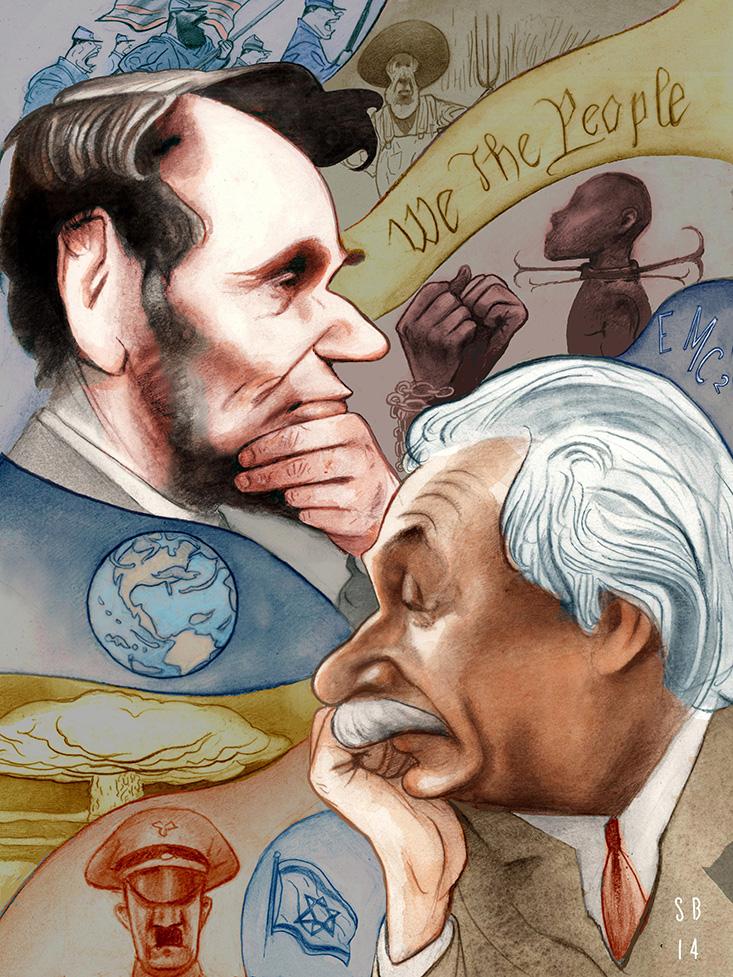Abraham Lincoln would still be remembered today as a self-taught prairie prodigy and an astute political operator who crushed the Confederate uprising, even without the Gettysburg Address, the Emancipation Proclamation, and the end of slavery. Albert Einstein would still be the most famous physicist of the 20th century, and the author of the most famous equation in history, had he not called on his fellow scientists to address the moral consequences of their discoveries, speaking out against war and nuclear weapons. But both men possessed a quality that went beyond their immense talents in politics and science and elevated them to world-historical stature: an ambiguous but distinctive quality that scientists, historians, and philosophers have begun to call moral genius. By suggesting that morality can, like math or chemistry or musical composition, admit of genius-level contributions, the phrase challenges us to reconsider the nature of genius itself.
Columbia University philosopher Elliot Paul observes that at first glance a great moral leader does not appear “creative” in the same sense as a revolutionary artist or a brilliant scientist. The ideas represented by Lincoln or Einstein or Mahatma Gandhi or Martin Luther King Jr., in their capacity as moral leaders, were not necessarily new. A great many 19th century Americans were deeply uncomfortable with slavery and understood that it conflicted with the nation’s alleged ideals on a fundamental level. Einstein was hardly the only person, or the only physicist, to notice that the immense scientific advance of splitting the atom threatened the human race with extinction. King and Gandhi personally experienced racial discrimination and saw it as a corrosive moral wrong that sickened entire societies, but they were certainly not alone.
Like high-achieving individuals in science or the arts, moral geniuses are willing to stand against conventional opinion.
What these people did that was creative and distinctive was to seize the moment—to recognize a great moral wrong and embrace the idea that they had a unique responsibility, and ability, to do something about it. Psychological theory on the subject of unusual creativity has often focused on the idea that genius is a self-created phenomenon. In the words of the late psychologist Howard Gruber, genius is best understood as “an organization that was constructed by the person himself in the course of his life, in the course of his work, as needed in order to meet the tasks that he encountered.” (Gruber’s gendered pronouns reflected standard usage at the time, highlighting the fact that women have historically been excluded from the category.)
Like high-achieving individuals in science or the arts, Paul suggests, moral geniuses are willing to stand against conventional opinion, often within their own nation or community, and seek to overthrow it. That kind of individual courage, we might say, becomes the subject or the text of the moral genius’s greatness. While the specifics vary greatly, we could describe a moral genius as someone who rejects the innate caution and the hypocritical compromises of normative social morality. (King’s “Letter From Birmingham Jail,” his most sustained accomplishment in rhetorical prose, addresses precisely this issue.) “To become a moral leader is a demanding and inherently risky thing to do,” says William B. Irvine, a professor of philosophy at Wright State University and author of the forthcoming book Aha! The Moments of Insight That Shape Our World. “And moral leadership is most important in a situation where everybody is going to look down on you as a social traitor.” Gandhi opposed not just British imperialism but also Hindu nationalism; Einstein was a lifelong Zionist who opposed the notion of Israel as a Jewish state; Lincoln’s decision not to arrest or prosecute the Confederate leadership was derided by Northern radicals, and remains controversial among historians.
Irvine’s book focuses on the moments of insight or clarity or special revelation that often seem to accompany history-shaping individual breakthroughs, whether in science, the arts, or the moral domain. Among numerous other examples, he considers the case of 18th-century British reformer Thomas Clarkson, who first adopted the anti-slavery position for strategic reasons, in an effort to win an essay contest as a Cambridge University student. Once he was rationally convinced of the rightness of the cause, Clarkson became consumed by the issue at a profoundly personal level, suffering from repeated nightmares about the horrors of slavery. “He tried to ignore it and push it off to one side, and it wouldn’t let go of him,” Irvine says. “The only way I can have peace in my life, he decided, is to become a moral warrior. Otherwise my conscience will never leave me alone.”

In Lincoln and Einstein, we see both the striving, self-created individual that Gruber describes and some evidence of Irvine’s “aha” moments. Years afterward, Einstein remembered the 1939 letter he wrote to Franklin D. Roosevelt, urging the United States to consider developing nuclear weapons, as the worst mistake of his life. It was certainly defensible in the context of the time, faced with the evidence that Hitler’s scientists were also pursuing the A-bomb. Einstein had been a pacifist and an activist for social justice throughout his life, but his sense of personal responsibility for Hiroshima and Nagasaki clearly drove him to become a leading spokesman on the dangers of nuclear war and a founder of the anti-nuclear movement, which would grow to a global scale decades after his death and ultimately compel the American and Soviet superpowers to step back from the brink of Armageddon.
Similarly, Lincoln had opposed slavery his entire life on moral and philosophical grounds. But well into the war years he continued to view the subject in pragmatic, political terms, repeatedly stating he was willing to tolerate the evils of slavery in order to preserve the Union. Tony Kushner’s screenplay for the film Lincoln offers a fictionalized “aha!” moment for Lincoln as he witnesses the carnage on the battlefield at Gettysburg and holds conversations with African-American soldiers. It’s a pretty good guess, insofar as Lincoln seems to have arrived, over a short period of time in 1863, at the understanding that the only way to make the dreadful slaughter of the Civil War bearable was to attach it to a great moral cause. What you might call the second “aha!” moment lay in his realization that “preserving the Union” without uprooting the moral evil that had poisoned the nation was not a goal worth pursuing, and perhaps not possible.
Highly creative people excel at “recognizing relationships, making associations and connections, and seeing things in an original way—seeing things that others cannot see.”
In any event, the famously terse speech that Lincoln delivered at Gettysburg—quite likely the shortest speech ever delivered by an American president, and certainly the most far-reaching—was a work of immense moral and rhetorical genius. It recast the terrible, exhausting war as a purposeful struggle to redeem the promise of America, and it did more than that: It recast the entire history of the nation to that point as a revolutionary thought-experiment that had not quite reached its logical fulfillment. From that day forward Americans have thought of 1776 as the beginning of our nation’s history (rather than the end of the Revolutionary War in 1783) and the high-flown philosophical language of the Declaration of Independence as central to our national identity. That speech was the work of someone with the peculiar ability to see history as if from the outside, seize its reins and change its course—and also someone willing to pay a grievous personal price for that historical role. It displayed intellect and openness in counterpoint, and a tremendously creative intelligence at work. We may attribute such an act of moral genius to unusual synaptic processing powers or to an invisible entity called the conscience. In either case it looks obvious and inevitable in hindsight, but required an extraordinary individual at the time.
Some researchers now suspect that this ability to stand outside of one’s immediate context and take a longer historical view, like other forms of genius, may have physical correlates in the brain. Neuroscientist Nancy C. Andreasen recently wrote that her study of the brains of highly creative people suggests that they excel at “recognizing relationships, making associations and connections, and seeing things in an original way—seeing things that others cannot see.” In objective terms, this shows up as much stronger activations (compared to a control group) in the association cortices, extensive regions on the outer surface of the brain that “interpret and make use of the specialized information collected by the primary visual, auditory, sensory, and motor regions.”
Andreasen’s initial research has primarily focused on prominent writers and other figures from the arts, but she supports the idea that unusual creativity is likely to be a similar neurological and biochemical phenomenon across fields and disciplines. Intriguingly, she also says that her research supports the age-old connection between exceptional creativity and certain varieties of mental illness, especially depression and other mood disorders. This cultural stereotype goes back at least as far as the Greeks, and it would seem to fit the examples of both Lincoln and Einstein. The former was well known for his melancholic disposition, and today would likely be diagnosed with clinical depression, while the latter had a family history of schizophrenia and (in Andreasen’s judgment) appeared to manifest some mild or borderline symptoms. (Martin Luther King suffered from depressive episodes, and attempted suicide at least once, and some evidence suggests that Gandhi also suffered from depression). Whether this connection is also rooted in brain activation patterns and processing speed is an unanswered but fascinating question.
Mental illness aside, three of the four people I have mentioned were assassinated by political opponents. If Einstein looks like a universally revered figure in the rear-view mirror, it did not always seem so during his life: He was the subject of extensive FBI surveillance and harassment, and consistently depicted as a traitorous or unpatriotic Communist sympathizer by right-wing critics. In this and many other respects, the moral genius reminds us of other genius tropes, like the misunderstood artist or the persecuted astronomer—such a person faces fierce opposition, and is not unfamiliar with suffering.
Andrew O’Hehir is a senior writer at Salon.com.























